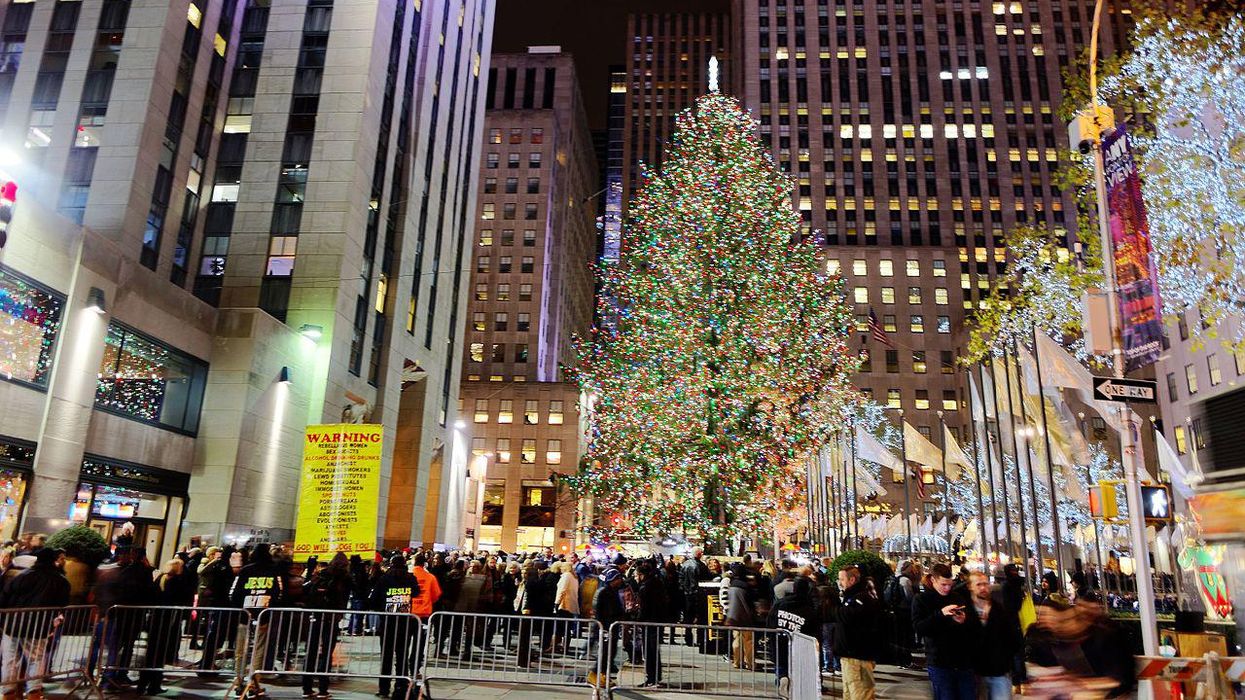There really was a 'War on Christmas' — and it came from Christian fundamentalists: religious scholar

December 20, 2021 | 10:44AM ETBank

The notion that there is a far-reaching “War on Christmas” is ludicrous. But that doesn’t stop Fox News and other right-wing media outlets from promoting the nonsense claim that liberals and progressives are out to destroy Christmas as we know it. Daniel N. Gullotta, a religious scholar at Stanford University, addresses the “War on Christmas” theme in an article published by the conservative website The Bulwark on December 20 — and stresses that when there really was a “War on Christmas” in the past, it didn’t come from liberals.
Gullotta points out that centuries ago, the “War on Christmas” came from severe Christian fundamentalists.
“The ‘war on Christmas’ has become as much a part of the annual tradition in America as the tree, the tinsel, and the tracking of Santa on NORAD,” Gullotta observes. “The incidents that seem to rile people up, from workers saying ‘happy holidays’ instead of ‘merry Christmas’ to winter-but-not-quite-Christmas-themed Starbucks cups, while cringe-inducing, are largely harmless nontroversies.”
"As strange as it might sound, the original \u201cwar on Christmas\u201d was among Christians."\n\nCheck out my last guest essay for the year in the @BulwarkOnline about Puritans and the original \u201cwar on Christmas.\u201dhttps://www.thebulwark.com/when-christmas-was-really-under-attack/\u00a0\u2026— Daniel N. Gullotta (@Daniel N. Gullotta) 1640004451
Gullotta goes on to say that while there isn’t a “War on Christmas” in 2021 — only annoying incidents here and there — some ultra-strict Christians of the past, including Puritans, really did a have a problem with Christmas celebrations.
“Despite the image of Christmas as a quintessentially American holiday, the widespread celebration of Christmas across the United States is a surprisingly recent development,” Gullotta explains. “As historians Penne L. Restad and Stephen Nissenbaum have pointed out in their respective books on the American history of Christmas, it wasn’t until the middle of the 19th Century that many Christmas traditions, such as gift-giving and sending seasonal cards, started to emerge in their recognizable forms. Only in the 1860s did Christmas start to gain recognition by various states as a legal holiday; not until June 26, 1870, did Congress declare December 25 a federal holiday.”
Gullotta continues, “What took so long? As strange as it might sound, the original ‘War on Christmas’ was among Christians. Because of Protestantism’s emphasis on biblical authority, some groups, like the Puritans, found the scriptural justification for Christmas lacking.”
The Puritans who lived in the United States centuries ago — back when Massachusetts and Pennsylvania were still British colonies — had a very strict and severe interpretation of Protestant Christianity. They were what are now known as “Christian fundamentalists” or “Protestant fundamentalists,” and as they saw it, Christmas celebrations were a pagan-like practice.
“The question of Christmas’ origins also became disputed, with Protestant theologians arguing that the celebratory date and many of its customs were pagan in origin, which seemed to lend credence to the Protestant belief that Catholic practices had corrupted Christianity,” Gullotta writes. “Through his own exegetical calculations, Robert Skinner’s ‘Christs Birth Misse-timed’ (1649) argued that earlier Christians had miscalculated the date, further demonstrating that ‘all error cometh from Rome.’”
Writing this guest essay also reminded me how much I love writing about Puritanism. For references:\n* Winship, Hot Protestants (2019)\n* @JohnGTurner2020, They Knew They Were Pilgrims (2020)\n* Capp, England's Culture Wars, 1649-1660 (2012)\n* Heyrman, Commerce and Culture (1984)— Daniel N. Gullotta (@Daniel N. Gullotta) 1640004993
Finally, thank you @SykesCharlie, @JVLast, @JimSwiftDC, @pennbarker, @amandacarpenter, @SarahLongwell25, @SonnyBunch, @Timodc, and @BillKristol for counting me as part of the @BulwarkOnline family.\n\nMERRY CHRISTMAS!— Daniel N. Gullotta (@Daniel N. Gullotta) 1640005210
Gullotta notes that in 1632, Puritan pamphleteer William Prynne equated Christmas celebrations with “paganizing priests and monks.” Another Puritan, Thomas Mockett, associated Christmas with Catholicism and “riotous drinking, health drinking, gluttony, luxury, wantonness, dancing, dicing, stage-plays, interludes, masks, mummeries.” And Puritan Philip Stubbs slammed Christmas as a time of “great wickedness.”
“In addition to fierce anti-Catholic sentiment,” Gullotta writes, “the Puritan attacks on Christmas were also fueled by concerns over the indulgent conduct and frenzied atmosphere the holiday seemed to produce…. Puritan efforts to quash the observance of Christmas did not manifest from pulpit preaching alone, but also, through legal efforts and government action…. The Massachusetts Bay Colony also did not celebrate Christmas and passed a law in 1659 fining anyone ‘found observing any such day as Christmas or the like, either by forbearing of labor, feasting, or any other way’ five shillings.”
If one gathered around a Christmas tree and sang “God Rest Ye, Merry Gentleman” during colonial times, it wasn’t liberals who had a problem with that — it was Christian fundamentalists who considering it a pagan-like activity. The tradition of bringing a Christmas tree inside and decorating it started in Germany during the 16th Century.
Eventually, Gullotta notes, Christmas celebrations prevailed in the United States, but the Puritan “War on Christmas” went on for a long time.
“While today’s hand-wringing about the supposed War on Christmas centers on imagined attacks on American Christianity,” Gullotta observes, “there is a rich irony in the fact that the longest and most sustained critique of Christmas — including its banning — came from those who were claiming to be the truest and purest defenders of the reason for the season.”